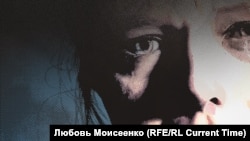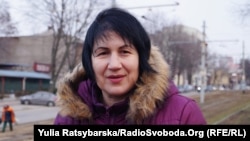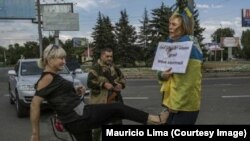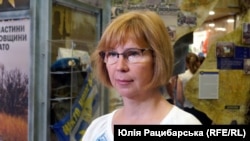Natalya was detained in 2015, in the eastern Ukrainian city of Donetsk, by Russia-backed separatists who accused her of "spying" for the government in Kyiv.
Held in a building that had previously housed the regional headquarters of Ukraine's State Security Service (SBU), she later recounted, she was locked up, beaten, raped, and refused medical attention.
"They brought me to one of the guards. I became angry, asking: 'What is this? Is this some kind of joke? It's impossible to stay in there," Natalya, 40, told a Ukrainian NGO.
"'Oh, is there something you don't like?' - said the guard. 'Give her to our boys and they'll tear her apart.' They brought me to this room where they were all drunk; there was such a stench. They threw a pillow over my head, held my hands and raped me," she said. "I don't even remember their faces. I remember one: he was bearded, unshaven, and smelled terribly."
Natalya spent two years as a captive in Donetsk, a provincial capital in eastern Ukraine, where war between Russia-backed separatists and Ukrainian forces erupted in April 2014, a month after Russia seized Ukraine's Crimean Peninsula. More than 13,000 people have died in the continuing conflict and the separatists still hold parts of the Donetsk and Luhansk regions.
After her release, Natalya gave an account of her ordeal to Ukrainian authorities, who never took up the case. "As the prosecutor explained to me, there is no way to prove this," she recounted to Ukrainian rights activists.
Natalya's story was documented by researchers from the Eastern-Ukrainian Center for Civic Initiatives (EUCCI). In a 2017 study based on interviews with nearly 300 interviews with women and men, the organization said that one in four reported some form of sexual violence at the hands of the separatists.
Fast forward to the present, and Natalya and other victims of sexual violence in the separatist-controlled parts of the Donbas region are still waiting for their abusers to face justice.
Volodymyr Shcherbachenko, head of the EUCCI, said that Ukraine's justice system is wary of pursuing such cases.
"The problem is that people who work in the justice system, from lawyers and investigators to prosecutors and the SBU, they don't want to tackle it. In such cases, the violence was committed a couple of months or even years ago, respectively. It is very difficult to investigate it," he told Current Time, the Russian-language network led by RFE/RL in cooperation with VOA. "The victims complain that they even discourage them; they tell them that such investigations are futile."
A major roadblock is that many of the alleged perpetrators remain in areas outside the control of Kyiv, with Shcherbachenko arguing Kyiv needs to appeal for international help.
Advocates for sexual-crime victims in the Donbas region say that such cases number in the thousands and Ukraine's failure to ratify the agreement on the International Criminal Court -- where such offenses could be classified as war crimes -- remains a major stumbling block for victims seeking justice.
'False Shame'
Even if Kyiv had better ways to get at the alleged abusers, there are other hurdles to justice as well.
"Only those who have experienced it can understand those who have experienced it," Valentina Buchok, who was seized by separatists in Donetsk in February 2017, told Current Time. "In addition, there is some false shame and a judgment that the victim is to blame. And the government has largely distanced itself from everything, from the prisoners of war, the hostages, and especially the victims of gender-based violence."
According to Buchok, she was grabbed on the street in the middle of a working day, and was accused of "espionage" due to a few photos of buildings found on her mobile phone.
The separatists sentenced her to 17 years in prison and held her for months at the so-called Isolyatsiya center, which before the war was an abandoned factory that had been transformed into an art gallery. The separatists seized the building shortly after taking control of the city of Donetsk in May 2014.
Buchok, 55, was released in December 2017 during a prisoner exchange between Ukraine and the Russia-backed forces.
"These people are sick to the core. Rape for them is just a method of torture. There was one girl who suffered horribly for the sake of all of us. They did terrible things to her -- there was rape in a perverted form more than once and by more than one person," she said. "I was undressed and was photographed as soon as I was taken prisoner. Right in the office. They just enjoyed the fact that they have power and they can do whatever they want with a person."
"We were taken to the bathhouse, and we were all over 50, and this women's bathhouse, not only is there complete unsanitary conditions, but there are also a bunch of men. these men are watching you and laughing. It's not very pleasant. You feel like a nobody," Buchok said. "They just destroy you."
Harrowing Image
Iryna Dovhan said she was so traumatized by her time in separatist detention that "I couldn't put on makeup, do my nails, wear a dress. I just didn't want anyone to pay attention to me as a woman."
Dovhan worked as a beautician in Donetsk, where separatists detained her in August 2014. She also was charged with being a spy for Kyiv. At the time, her family was living in Mariupol, a government-controlled city in the Donetsk region on the Sea of Azov.
She was beaten, fired at with a bullet grazing an ear, and threatened with rape.
Dovhan was also subjected to public humiliation that was captured in a photograph that gained worldwide attention and may have led to her release after five days in captivity. She was tied to a pole in downtown Donetsk, draped in a Ukrainian flag, and forced to hold a placard that read: "She is a spy and a child killer."
She was subjected to abuse by passersby, including kicks, and one of those blows was documented in a photograph that went viral.
"These are people with no moral principles whatsoever," Dovhan said. "These are people who before were laborers and drunks and now suddenly they were answerable to no one."
"I had photos of my 15-year-old daughter on my tablet. They started telling me that they would find her and bring her there," Dovhan said, adding the separatists threatened in the cruelest and crudest terms that her daughter would be gang-raped once they found her.
Dovhan said that at Isolyatsiya, women were often held in a former clear shower cubicle that was monitored by a camera hanging overhead and impossible to escape due to a grate blocking the exit.
"A woman could be put here for a week, given a five-liter jug to use as her toilet. All the time they [the separatists] are watching," recounted Dovhan.
It's unclear how many victims of sexual violence there have been in separatist-controlled eastern Ukraine.
"We are still creating a single database to document such crime. And since the government has not yet put this into a single register, since how to qualify these crimes is still unclear, there are no firm statistics," said Nelly Yakovleva, deputy head of the parliamentary subcommittee on gender equality and nondiscrimination. "If we can't track and record this in areas of Ukraine under government control, then what is happening in uncontrolled territories is virtually unknown to us."
Victims of sexual violence in areas of the Donbas controlled by separatists "number in the thousands," said the Ukrainian government ombudsman for gender policy, Kateryna Levchenko.
Levchenko said part of the reason Ukraine's Justice Ministry has failed to tackle the problem is "inconsistency" between Ukrainian legislation and "provisions of international criminal and humanitarian law."
Yakovleva said much of that comes down to Ukraine's failure to formally join the International Criminal Court.
It was established as an intergovernmental organization at The Hague in 2002 under a treaty known as the Rome Statute of the International Criminal Court.
"Ukraine has not yet ratified the Rome Statute, so the Ukrainian legislation does not contain the classification itself -- rape, forced undressing, forced pregnancy, forced sterilization -- which is provided for by the Rome Statute," Yakovleva said.







